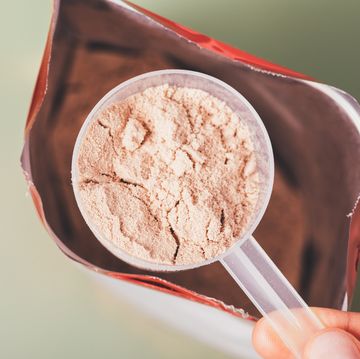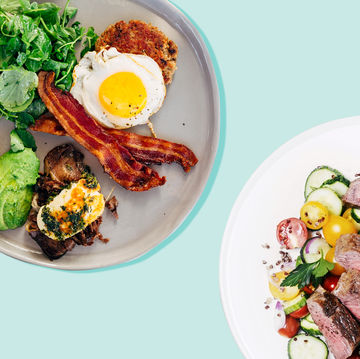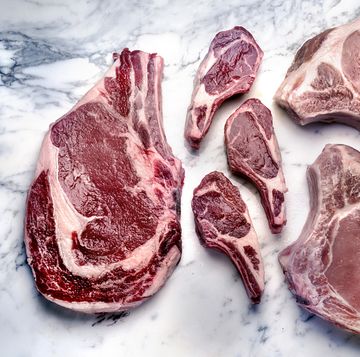I'm not the gambling type — Texas hold 'em, firehouse bingo, and glitzy casinos thrill me about as much as a week-old bologna sandwich. But when a major family reunion loomed recently, the prospect of greeting relatives and old friends and smiling for the camera inspired me to ante up and make a weight-loss bet.
Hoping to lose 10 pounds in 10 weeks, I needed a worthy opponent. I couldn't imagine betting against my women friends — we've always encouraged one another as exercise buddies and comrades ordering lunch salads with dressing on the side. So I asked my husband. Dan and I have kept up a fierce Scrabble rivalry for 18 years, and we wager at the drop of a hat on everything from local political races to how soon a traffic light will turn green. He agreed in seconds, and was taunting me about his own weight-loss prowess within minutes. Game on.
We set weekly goals (1 pound for me, 1 1/2 for Dan — men burn calories more easily because they have more muscle mass), scheduled weigh-ins on Monday mornings, and deliberated over prizes. (Foot rubs and morning coffee in bed won out over cash.) But when the wager began, so did the sabotage. In week 1, Dan brought home my favorite chocolate-covered coconut-cream candy. (I tossed it in the freezer.) I couldn't bring myself to retaliate, but secretly, I strategized. In week 2, I stopped popping popcorn for our family's Sunday movie nights because — I'd learned in week 1 — it boosted my weight the next morning.
There were technical difficulties: Our 11-year-old bathroom scale got trashed by week 3, replaced with an unflappably accurate digital model. There were agonizing defeats, like the week I gained three pounds of utterly unfair water weight. And there was a little good-natured trash talking: "This coffee in bed sure tastes good when you're slim like me...."
Ten weeks later, I had lost 8 pounds. Dan dropped 5. I won! My jeans fit better. My waist was smaller. I loved walking into our family party in my slim black pants and sheer ruffled blouse over a camisole. My final prize? An extra-long foot rub with my favorite lemon-scented balm.
Ah, victory is sweet.
Up the Ante, Drop the Pounds
Diet bets are popping up everywhere — online, in gyms, at weight-loss classes, and as informal wagers among friends, spouses, and coworkers. They're big because they work. A multicenter study of 57 dieters found those who stood to lose money if they didn't succeed in shedding weight were about five times as likely to reach their goal as those with no financial stake in the outcome. Half of the bettors dropped 16 pounds in 16 weeks, compared with just 10.5 percent of the no-wager group. And in a study of more than 200 dieters at the University of North Carolina at Chapel Hill, those who were told they'd pocket $14 for every 1 percent of body weight they shed were nearly five and a half times as likely to take off 5 percent of their body weight as participants not offered cash.
Putting money, ego, and bragging rights on the line is a potent formula for keeping up your motivation. "If eating chocolate cake tonight means you'll lose $10 or $50 at your next weigh-in, dessert suddenly isn't very attractive," notes Dean Karlan, Ph.D., a Yale University behavioral economist. After losing 40 pounds in a personal bet with a friend, Karlan went on to found stickk.com, one of the first online weight-loss betting sites. "When there's something big at stake, you can't say, 'Oh, I'll eat less next week. I'll work out longer tomorrow.' You have to stay on track all the time, because doing the wrong thing would be very expensive."
Nobody wants to lose a bet. "More than anything I didn't want to be beaten by my opponents and feel embarrassed," admits Amy Orr, 32, of Brooklyn, who dropped 61 pounds in a series of bets with friends and even her former husband. "I've been on every diet out there — Atkins, Weight Watchers, raw foods — you name it. None worked as well as this."
Wagering on weight loss might even set off feel-good fireworks in the brain. In brain-scan studies at Massachusetts General Hospital, Harvard researchers found that gambling lit up the same little gray cells activated by morphine and cocaine.
Then there's the accountability factor. "Checking in with somebody every week is definitely going to help you stay on course," says New York City diet expert and registered dietitian Elisa Zied, M.S., R.D. "It's competitive in a playful way."
The extra ka-ching doesn't hurt, either. "Some people are definitely in it to win the money," says wellness coach Lisa Sallin of Thousand Oaks, CA, who runs 12-week healthy-weight-loss challenges. About $25 of each participant's $39 course fee goes into a pot. The winner gets half; second place earns 30 percent; third, 20. And we're not talking pocket change: "The winner in my biggest group dropped 13 percent of his body weight and took home $200," says Sallin.
Where the Bets Are
Weight-loss wagers can be as simple as finding a willing friend, spouse, or colleague. You can even bet against yourself, earning a prize every time you reach a goal. If you fail, you take the money out of the kitty or give it away to a favorite cause.
Or you could take advantage of free Websites like stickk.com and another, fatbet.net. These sites have refereed tens of thousands of diet bets; success rates vary, but Karlan says that up to 80 percent of extremely committed participants hit their goals. Online, you can bet solo, join up with friends, or even arrange to have your weekly results e-mailed to a designated crew of cheerleaders.
At stickK, where the motto is "Put a contract out on yourself," you select a commitment contract — for weight loss or for other goals such as quitting smoking, exercising regularly, or getting enough sleep. You can choose a friend to serve as an independent third party to receive weekly reports and verify your progress; you can add other pals as cheerleaders, too. For extra oomph, you can let some money ride on your progress. Miss your goal, and the amount you choose is transferred from your credit card to a good cause (such as the American Red Cross or Doctors Without Borders) or to a group of "anti-charities" with more partisan agendas; stickK's list includes pro-choice and antiabortion groups, several presidential libraries (Republican and Democratic), and even British soccer teams. "Some people are much more motivated when their cash will go to a group they don't agree with if they fail," says stickK's Karlan.
At Fatbet, it's all about competition. You gather one or several bettors, set goals, and decide on a wager or penalty (no money changes hands on the site, and nonmonetary incentives, like "the loser sings at a karaoke bar," are OK). The honor system rules. Everyone posts her weight daily. The site provides nifty graphics showing your progress and a message board where you can taunt or encourage your opponents. Catherine Reed Holochwost, 30, an art historian from Montclair, NJ, lost 23 pounds last year thanks to a Fatbet wager with her spouse. "My husband and I have always been competitive about silly things, like, 'What's the capital of North Dakota?' so it was really fun," she says. "I had lost some pregnancy weight after our son was born, but the rest just wasn't falling off. I went for a lot of walks pushing the carriage, and I hit my goal."
Raising Your Odds
To make sure your wager is a winner, experts advise that you:
Set a smart goal. "Don't get carried away by the spirit of competition," Zied warns. "Make sure your goals are reasonable. If you try to lose too much too fast you may set yourself up for fast regain later."
The classic rules apply: Women should aim to lose about a pound a week, men up to two. As a woman, you may have to contend with more ups and downs, thanks to hormonal shifts that can slam you with water-weight gain on weigh-in day. "But even if the scale doesn't budge, or goes up a few pounds because you're premenstrual or had some extra sodium in your diet, be patient," says Zied. "You're still a winner if you're simply making healthy choices and exercising."
Pick a worthy opponent. The best betting partner is someone you feel competitive with — and who won't give you a pass. "If you think your opponent might let you off the hook, your bet will fizzle," says Adam Orkand, a Seattle software developer and cofounder of Fatbet.net. "You need a little rivalry to spur you on."
Award fabulous prizes... or set horrible penalties. Cash wasn't a big motivator in my weight-loss bet, because my husband and I have a joint bank account. But coffee in bed and foot rubs required extra work on the part of the week's loser — and allowed the winner the opportunity to lie back and gloat. "Your bet should be realistic, but big enough that you absolutely won't want to lose," Karlan says. Holochwost and her husband bet things that mattered to each of them. Her prize? Her husband took over giving their son his 4 a.m. bottle for a week. "He would have done it anyway, but it's the spirit of the thing," she says. If her spouse had won, Holochwost would have played "a really, really long, boring board game about World War II."
Have a post-bet plan. The day my weight-loss wager ended, I slacked off. I munched a cinnamon bun in the airport on the way to the family reunion and left my exercise band at home. There was cake! Wine! Popcorn! Cheese! More cake! On and on it went, until I put three pounds back on.
It's crucial to plan for your post-bet life. "Some people find that out the hard way," Orkand says. "They lose 30 pounds, then go back to their old ways, regain most of the weight, and have to do it all over again."
If you backslide after the challenge, the reason is you're not thinking long-term, Sallin says. "But if you can use your bet to learn healthier habits, you'll be a real winner."
One trick: Keep on betting. That's how Karlan and Orkand are preventing gain, and Sallin notes that many alumni of her class keep coming back in order to maintain their new physiques. Me? I've signed up for an online weight-loss wager in which $5 a week goes to charity if I don't make my goal. I'm back on the scale every Monday morning. This time there are no foot rubs, no sabotage, no friendly gibes from my spouse. Betting against myself is quieter, more focused on the number on the scale. But it's working. So far, I've dropped five pounds — this is one bet I plan to win.
Would a Bet Help You Lose?
Four Ways to Know
Researchers, diet veterans, and founders of betting Websites say wagering might be your ticket to weight-loss success if:
1. You thrive on friendly competition. A bet is not a touchy-feely, emotionally supportive buddy system. If you feel energized by rivalry, you're ready to gamble.
2. You're out to win — whether it's at sports, board games, or simply making the best dish for the neighborhood potluck supper. Or you like competing against yourself.
3. You know how to lose weight, but have trouble sticking with your plan. Betting works with any diet or exercise plan, and can keep you motivated for the long haul.
4. You need a wake-up call. You think you're following a good weight-loss program, but the scale isn't budging because you're letting yourself cheat or you slack off on exercise too often.
Secrets of Their Success
Bets kept them on track, but weight-loss gamblers took these steps to peel off pounds:
1. Portion control. My own weight-loss bet helped me resist seconds. I also cut back on high-calorie extras like cookies, ice cream, and cheese-and-cracker snacks.
2. Writing about it. Successful weight-loss bettor Amy Orr of Brooklyn used the message board of one betting Website as an open-access food diary that others involved in her bet could read. "We wrote what we ate, which really helps keep you honest," Orr says.
3. Regular exercise — no excuses. Calorie-burning physical activity is a weight-loss cornerstone. "I run almost every day now," says Adam Orkand. "In the past I would have skipped exercise, but now I know I need it to maintain my weight. And I actually enjoy it."
4. Filling foods. Eating more fruit and vegetables will fill you up without adding a lot of calories, says Lisa Sallin. "Lean protein — half of it plant-based, like beans and soy — is also really important because it keeps you feeling satisfied."
If you're not sure which diet will work best for you, check GH's Diet Matchmaker, or try the Snack-All-Day Diet Plan or one of our other great diet plans.













